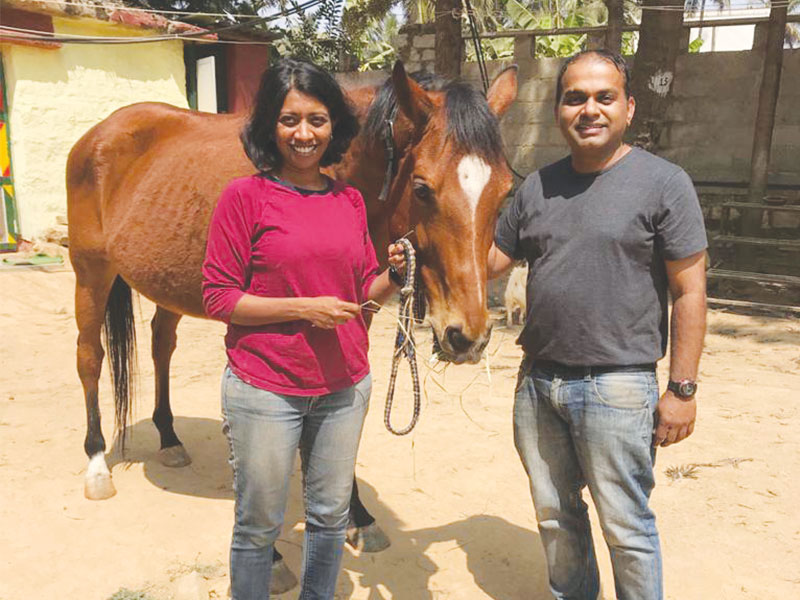With growing awareness of the benefits of animal-assisted therapy as an alternative to traditional medical curatives, there is rising demand for qualified AAT practitioners – Paromita Sengupta
Last year, San Francisco International airport added a five-year-old piglet named LiLou to its ‘wag brigade’ to ease anxiety among stressed-out flyers. Even staffers and senators on Capitol Hill, Washington D.C. often cuddle trained therapy canines. Research studies conducted by Johns Hopkins University, Baltimore (USA) suggest that domesticated animals such as dogs, cats, rabbits and horses stimulate ‘happy’ hormones — serotonins and endorphins — infusing joy and energy in individuals undergoing animal assisted therapy.
Against this backdrop of growing awareness of the benefits of animal-assisted therapy (AAT) and animal assisted interventions (AAI) as alternatives to traditional medical curatives, there is rising demand for qualified AAT practitioners in education institutions, hospitals, airports, old age homes, prisons, mental health centres, academia and research.
High emotional intelligence quotient, love of animals, attention to detail and well-developed communication skills are essential attributes for a successful career in animal assisted therapy. While over the past four decades, AAT has gained traction in the US and Europe, this is a more recent career option for Indian youth following the promotion of dedicated AAT education centres in Mumbai (Angels and Manav foundations), Bangalore (Paws and Hooves).
Study programmes
There is no officially approved accrediting organisation for animal-assisted therapy education/training. However, several diploma/certificate programmes are available. Some programmes involve direct on-campus training, a distance learning (online) option, and a combination of on-campus and online training. Most programmes don’t demand any specific educational background, although some require an undergraduate degree.
Nevertheless, most successful animal-assisted therapists are psychology/psychiatry graduates and/or diploma holders in rehabilitation and occupational therapy and other healthcare disciplines. Among reputed organisations providing training and certification are Pet Partners, Washington (USA); Animal Behaviour Institute, North Carolina (USA); Paws for Friendship, Florida (USA); Center for Excellence (UK), as also the University of Texas (USA) among other universities in the West. In India, Christ University is the sole established higher education institution offering AAT as an elective subject in its psychology degree programme.
Pay & progression
Although AAT is not yet a high wage island, salary packages are set to balloon in the near future. Currently, a fresher is likely to earn Rs.20,000-30,000 per month and a practitioner with three-four years’ experience between Rs.60,000-100,000. Prospects of pay packages doubling in the next two-three years are in the offing. Careers in academia and research are other equally lucrative options.
Professional profile
“With rising awareness of the benefits of AAT and AAI within the Indian healthcare community especially neurologists, psychologists, psychiatrists, physiotherapists and occupational therapists, and among households with special needs individuals, this is a fulfilling and potentially lucrative career for the growing number of animal lovers,” says Subhadra Cherukuri, an AAT practitioner certified by The Center of Excellence, UK and co-founder of Paws and Hooves, Bangalore.
A former management consultant with Ernst & Young, Cherukuri and Kishan Vasudevan, a former banker, quit high-profile corporate jobs to make careers out of their love of animals. In October 2018 they co-promoted the Paws and Hooves initiative of Wag-ville Pvt. Ltd on a four-acre farm, Jakkur, Bangalore. Paws and Hooves — India’s first integrated AAT centre — offers canine (dogs) and equine (horses) assisted therapy to medically referred patients.
The promoters of the company take pains to emphasise that Paws and Hooves is not a feel-good farm open for animal lovers and picnicers. “We offer AAT through certified therapists and special needs educators, physiotherapists, psychologists and most important, our specially trained dogs and horses. Apart from providing AAT to individuals we also conduct animal-assisted activity sessions in hospitals, corporate workplaces and schools to alleviate pain, stress and anxiety,” says Vasudevan, an AAT practitioner certified by Pet Partners, USA.
